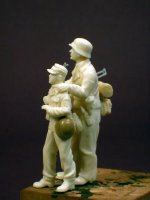What Dads Mean to Their Sons: The Discipliner
 Dads give sons a hero to emulate, a protector to depend upon, and an authority to answer to. The third aspect I’ve chosen to spotlight is this: discipline.
Dads give sons a hero to emulate, a protector to depend upon, and an authority to answer to. The third aspect I’ve chosen to spotlight is this: discipline.The discipliner. Boys are naturally grubby little buggers. They get into stuff, they destroy things, they take things apart, they hit each other, they ridicule girls, and so on. They compete with one another and cheat at it. They resolve disputes with bloody noses. They overstep their bounds aggressively, and do so repeatedly. From birth, boys are fun. They are also bad.
Which makes the fact that the natural family includes a built-in discipliner a marvel. How nuanced and excellent is the design of the natural family. Fathers are both disposed to discipline and well suited for it. They need not read books to know that they must correct their charges. When they see their boy mistreating his sister, something flames up inside them, and controlled but firm discipline ensues. When one son cheats another at basketball, and the cheated party breaks out in tears, dad feels a natural surge to right this wrong. When his son smart-talks his mother who just worked for hours to clean the house, Dad understands the injustice of this exchange, and takes action to rectify it. He teaches his son that there are boundaries in life. Not simply this, but transgression of those boundaries involves not simply Mom’s displeasure, but Dad’s hickory switch.
I recall hearing pastor John Piper talking in an interview of his role as father of his four boys. It was an aside in a conversation on his published material, but it was priceless. “It is my duty,” he said, “When my boys talk back to their mother, to say “You do NOT talk to your mother that way.” You could see the emotion in him. It was not overheated anger. It was righteous rebuke. You could see in his clenched jaw his conviction. There must be this in a father. He is to lavish love on his son, play with him, knock him around, play catch with him, but he is to bring sure and swift discipline when wrong is done in his home.
The boy who does not have this figure in his life misses the corrective built-in by God for his benefit. Sure, his mother will discipline him. But it will not be the same as that provided by a father. Women simply not are as intimidating as a father. They can be intimidating, but they are not naturally so given to intimidation and “presence” as is a dad. Anyone who has ever experienced the rising anger of their father knows this. Mom can spank too, but it’s different. Dad is to be feared when we do wrong. He represents the Just One who rules over us with perfect discernment, and who is to be feared above all else. Boys who do not have this representation will not have this sense of fear. They learn over time, as they grow larger and stronger and tougher than Mom, that they can disobey her. Chores don’t have to be done. Curfews don’t have to be observed. Rules can be broken. Not so with the boy whose father is his hero, his strength, his discipliner.

0 Comments:
Post a Comment
<< Home